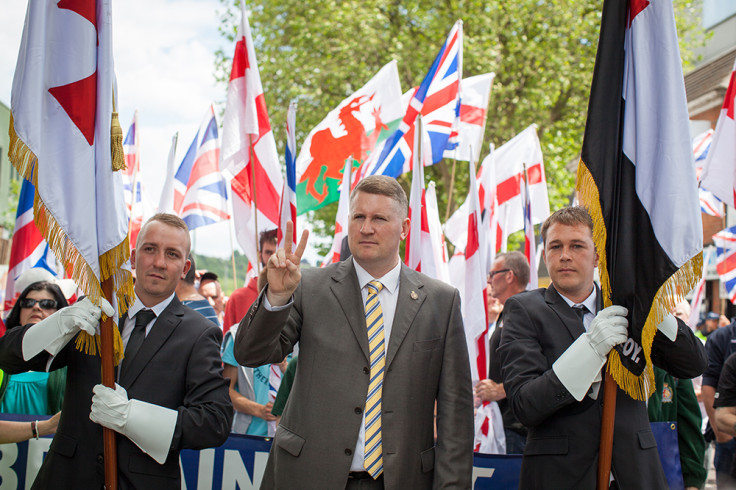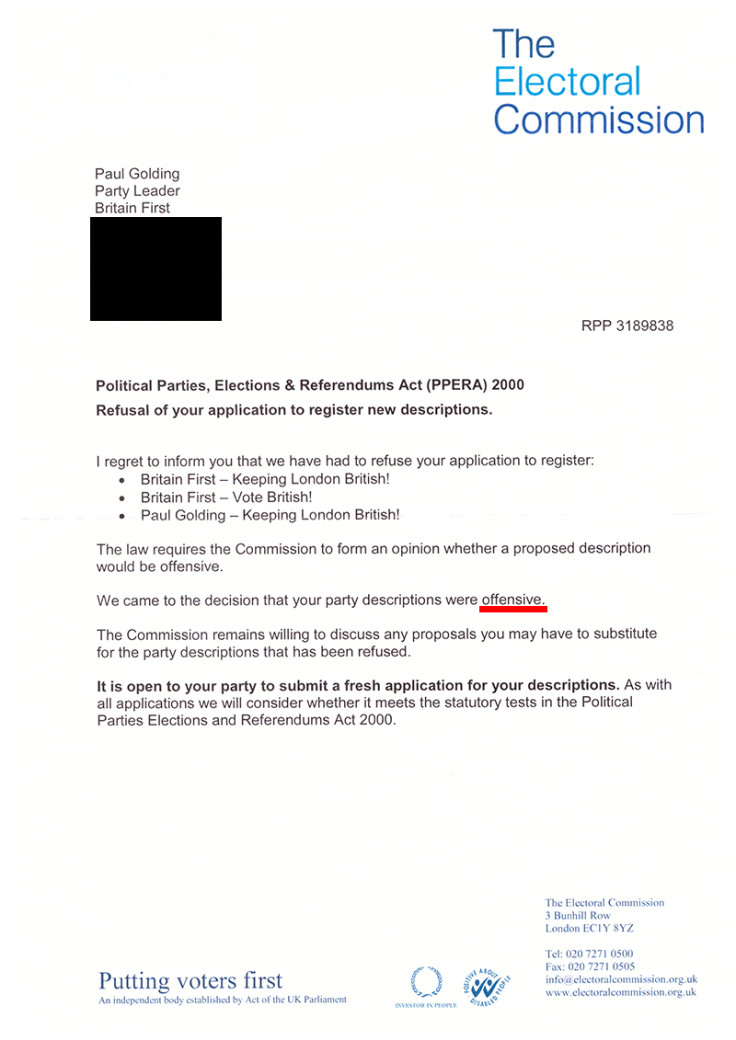Mayoral Election: Britain First banned from using 'Keeping London British' slogan

Britain First has been banned from using "Keeping London British" as a slogan for its mayoral election campaign after it was deemed offensive. The Electoral Commission also told the anti-immigration party it would not be allowed to use the phrase "Vote British" on ballot papers, for the same reason.
Leader Paul Golding, who is running in the London Mayoral elections in May, accused the commission of acting as "Commissar for Political Correctness" and said the body was limiting free speech.
"The Electoral Commission is supposed to be an impartial body that regulates UK elections," the party said in a statement on 9 March. "However, lately the Electoral Commission has started to show political bias towards certain right-wing parties.
"We are supposed to live in a democracy with freedom of speech, but not any more. Only those deemed politically correct are permitted freedom of expression."
The Political Parties, Elections and Referendums Act 2000 requires the commission to decide whether proposed descriptions of political parties, to be printed on ballot papers, are "obscene or offensive" to voters. The laws do not precisely define what should fall under this category, instead requiring the commission to "interpret what was intended by the authors of the act".

Staff are supposed to consult a lengthy legal guide (see below) before making any decision and are advised to "balance rights of the voters against freedom of speech". One section of the guide states: "What is offensive has to be judged by considering the reaction of reasonable people who are neither hypersensitive nor insensitive and by the standards of an open and just multiracial society."
A letter sent by the Commission to Britain First in October, but which was only made public by the party yesterday (9 March), said: "We came to the decision that your party descriptions were offensive. The commission remains willing to discuss any proposals you may have to substitute for the party descriptions that has (sic) been refused."
It represents just the latest run-in the party has had with the independent UK regulator. In 2014, the commission issued an apology to the family of murdered fusilier Lee Rigby after it allowed Britain First to use the slogan "Remember Lee Rigby" on ballot papers during the European elections in Wales.
Golding, 34, announced his intention to run for mayor in September, with the party saying it wanted to reach the "45% [who] are still ethnically British". The party, which describes itself as a "patriotic Christian movement", advocates for the return of capital punishment, an end to immigration and banning Islam.
Legal guide for determining whether a description of a political party is "offensive" (Source: Electoral Commission)
1. The commission should consider the matter carefully and take into account all relevant factors and disregard all irrelevant factors. The commission should ensure that its final decision is reasonable. There may be a range of reasonable decisions in any case. A court is unlikely to seek to substitute our judgment with its own of what is "offensive". Rather it would look to test whether any decision by the commission is reasonable. Accordingly, a court is unlikely to find a commission decision within the "reasonableness range" as unlawful.
2. There is no special legal meaning of "offensive" either in electoral law or other relevant legal contexts. Therefore, "offensive" should be given its natural meaning.
3. The commission should take into account any contextual factors that may affect whether or not the name or description is "offensive". This includes but is not limited to considerations as to connotations of the proposed name or description in the light of socials mores and public policy.
4. The commission must only look at whether the name or description is offensive not any other aspect of the party, e.g. its policies. However, the party's policies may form part of a relevant context that affect whether the name or description is offensive and, if so, should be taken into account.
5. The test is whether the name or description is "offensive". This should not be confused with whether the name or description is the view of a minority or whether the name is controversial or unpopular.
6. What is offensive has to be judged by considering the reaction of reasonable people who are neither hypersensitive nor insensitive and by the standards of an open and just multi-racial society.
7. The test for whether a proposed name or description is "offensive" is a high one; it should be considered to be particularly offensive for the commission to decide that the party's application for registration should be refused .
8. Could the name or description be considered to be "political" expression? This is interpreted to be anything that discusses a matter that is political in nature or is of public interest. If so, the risk of a successful legal challenge for breaching the ECHR is increased as such expression receives higher protection.
9. Additional protection is also afforded under the ECHR to comments made in election campaigns. As a party's name or description is a key part of election communications, this increases the risk of any decision to refuse to register a name or description being challenged for breaching the ECHR.
10. Does the name or description criticise politicians, governments or other powerful organisations? If so, any decision to refuse to register it would be subject to an increased risk of successful legal challenge as such expression is highly protected by the courts.
11. If minded to refuse to register a party, or a description, on account of party's name, or the description, being offensive, the commission should consider whether doing so would be justified under Article 10(2) ECHR. For example, is the decision necessary to protect public safety, morals or the rights / reputations of others?
12. If the commission were to decide that a name or description was offensive and that the language used was highly insulting to particular racial or ethnic groups or that the language used incites violence or spreads hatred, there may be a strong argument that the restriction of the Article 10(1) ECHR right to freedom of expression by refusing to register the party is justified under Article 10(2) because of the need to protect public safety, morals or the rights / reputations of others. Refusing to register such a name under section 28(4)(c) PPERA on account of it being 'offensive' may be justified under Article 10(2) even if it constituted 'political expression'.
© Copyright IBTimes 2024. All rights reserved.







